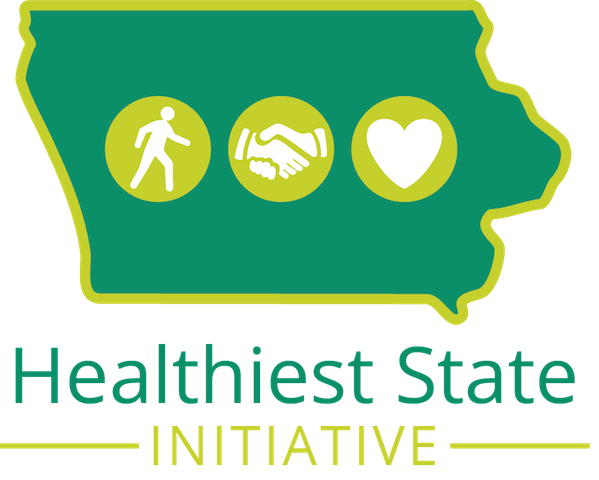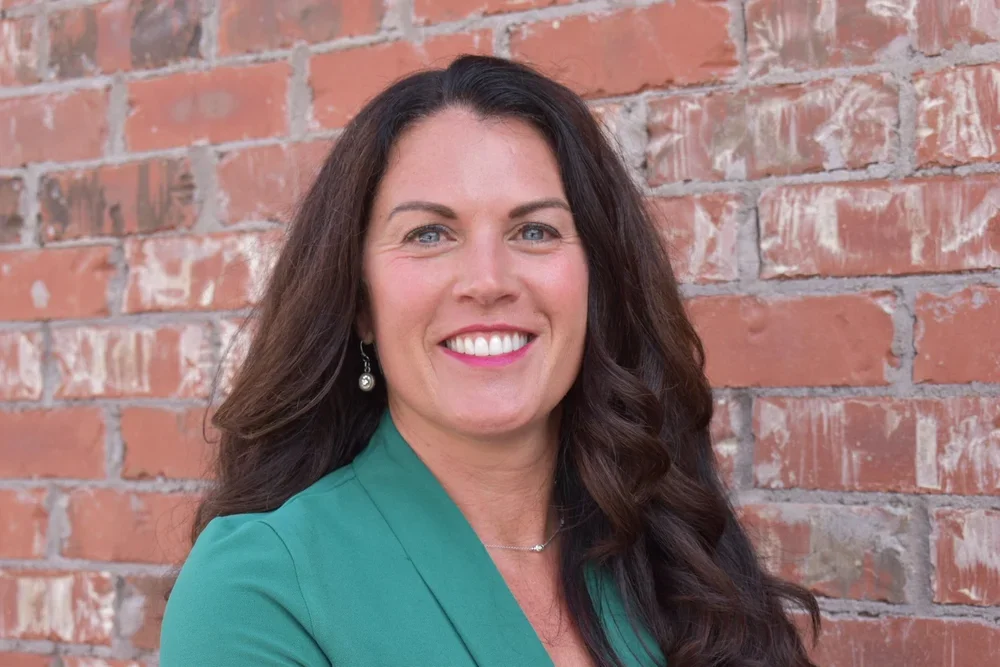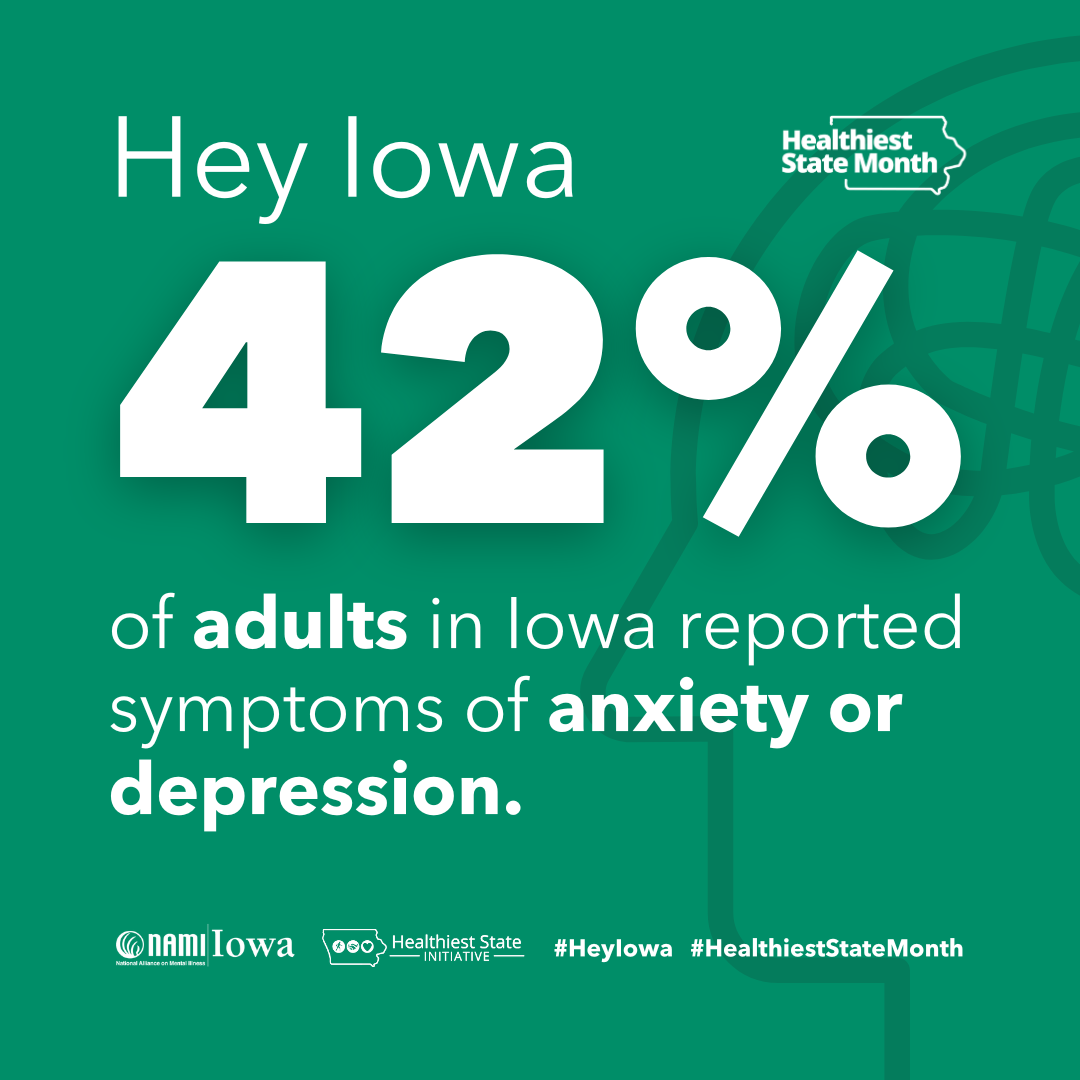Mental Health with NAMI Iowa - Healthiest State Month Week 1
Iowa Healthiest State Initiative Executive Director, Jami Haberl
Mental health affects every corner of our state – from rural communities to urban centers, from classrooms to workplaces. Talking about mental health isn’t new, but the conversation has taken off in recent years, especially since COVID-19 turned life upside down. These days, more people than ever understand how critical mental health is for our overall well-being, and we’re starting to see the stigma surrounding mental illness fade somewhat, particularly among young people. But there is plenty of opportunity to address both stigma and access to mental health services. Here’s the reality: mental health struggles are more common here than a lot of people might think. NAMI Iowa reports that 42% of Iowa adults have experienced symptoms of anxiety or depression — that’s about 20% higher than the national average reported by the Centers for Disease Control and Prevention (CDC). And every year, about 1 in 20 adults in Iowa have serious thoughts about suicide, which is roughly in line with the national rate of 4.9%. For adolescents aged 12-17, that number narrows to 1 in 9.
The first step towards addressing mental health is reducing stigma, which is the number one barrier to people seeking the help they need. Led by the Iowa Healthiest State Initiative, Make It OK is a statewide community campaign designed to reduce the stigma of mental illness by encouraging open conversations. Through education, storytelling and community engagement, Make It OK helps Iowans understand what mental illness is and what it isn’t. If we don’t understand mental illness, it’s difficult to know how to support those who struggle with mental illnesses.
While systemic change is essential, individual actions matter too. Here are a few ways Iowans can reduce their risk of mental illness and support their own well-being:
Stay connected: build and maintain strong relationships with family, friends and community.
Move your body: regular physical activity improves mood and reduce anxiety.
Sleep well: prioritize rest – poor sleep is linked to depression and other mental health issues.
Limit screen time: especially social media, which can negatively impact self-esteem and mood.
Practice mindfulness: meditation, journaling or simply taking time to breathe can help manage stress.
Eat for mental wellness: a balanced diet rich in omega-3s, leafy greens and whole foods support brain health.
Avoid harmful substances: limiting alcohol, avoiding tobacco and steering clear of recreational drug use can significantly reduce the risk of developing a mental health condition.
Lastly, seek help early. But once someone begins seeking help, is there help for them to find? Iowa ranks 43rd in the country for access to mental healthcare providers. 1.3 million people in the state live in a community without enough mental health professionals. There is a lack of places to find care in the state, and importantly, not enough people working in social work and mental health fields to work in many of the offices that do exist.
Iowa legislators and organizational leaders are aware of the need for a renewed focus on mental health. In May of 2024, a new law was signed, completely reshaping the mental healthcare system in the state. The new system, known as the Behavioral Health Service System, began on July 1st, 2025, and combines mental health and substance use services into seven behavioral health districts in an effort to streamline the system and enable better coordination of care. The Iowa Primary Care Association will operate statewide as the Administrative Service Organization for this new system, a role commonly referred to as the Behavioral Health Administrative Services Organization (BH-ASO). The changes have critics worried about provider stability and continued access for care, particularly as we await federal Medicaid cuts.
This is the landscape Iowa finds itself in with mental healthcare and awareness. As we wait to see the effects of recent legislation, there’s more we all can do and support to make a difference in our communities. So where do we go from here?
NAMI Iowa Executive Director, Ryan Crane
Mental health is one of the major issues of our time and we find ourselves in the midst of an epidemic, but there are still plenty of ways we can come together to make important progress.
NAMI Iowa has hope for the changes made through the BH-ASO and the state’s recent focus on high acuity youth is a great relief. Also, as part of the CAMHI4Kids Coalition, a group of subject matter experts advocating for stable, long-term funding to create a unified mental health system for children, our organization will publish 2026 priorities later this fall that Iowans can support. Finally, two bills passed the Iowa House in 2025 and will be reintroduced in the Senate in 2026 that we are hoping to drum up support for, House Files 385 and 312.
HF 385 is a proposal aimed at helping people who are leaving a mental health facility or hospital. The goal is to make sure they have support, referrals, and resources right away, so they don’t end up back in crisis and back in the hospital soon after.
HF 312 aims to make it easier to step in when someone is having a severe mental health crisis. It would expand the use of a “psychiatric deterioration” hold — meaning a person could be temporarily committed or recommitted to a facility to prevent their condition from getting worse and to keep them safe.
All Iowans can voice their support for these bills on capitol hill, but there’s more we can do as individuals as well.
Share resources with friends and family, including the 988 Suicide and Crisis Lifeline, there are incredible tools for Iowans to help those who are struggling.
Raise awareness and be a voice against stigma.
Share your story: Share your own experiences with mental health, be there when a friend or family member is in need, and speak out against stigma.
Become a Make It OK Ambassador.
Advocate for policy change: Join NAMI Iowa’s advocacy efforts and stay informed on legislation affecting mental health.
Progress has been made in normalizing and discussing mental health in schools and workplaces, but we can always do better, and I challenge leaders to make mental health a priority for students and employees.
Our state is in a tough spot when it comes to mental health and access to quality mental healthcare, we have a long way to go. But there are plenty of reasons to be hopeful, and there are many impactful ways everyone can get involved to make the conversation bigger. If we work together and prioritize mental health we can make Iowa a state in which all people affected by a mental illness can experience resiliency, recovery and wellness.
Spread the Word: Download these graphics for free and share them on social media with #HeyIowa and #HealthiestStateMonth!
Support the Iowa Healthiest State Initiative: The Iowa Healthiest State Initiative is a nonprofit, not a government agency, our work is made possible by the support of Iowans like you! Consider making a donation to help continue our work across the state!








